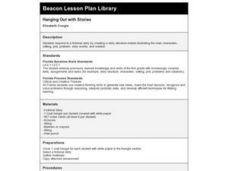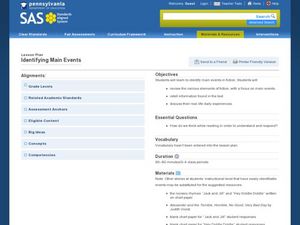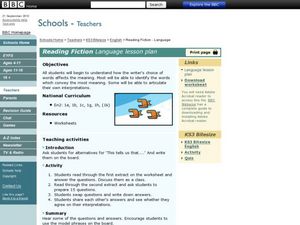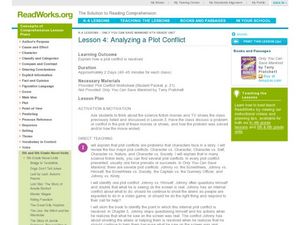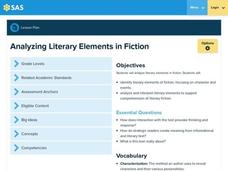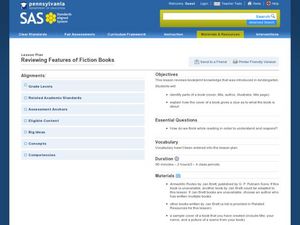Curated OER
Comparing and Contrasting Fiction and Nonfiction
Second graders analyze differences between fiction and nonfiction texts. In this compare and contrast lesson, 2nd graders review texts, discuss similarities and differences, and complete a Venn Diagram.
Curated OER
Historical Agency in History Book Sets (HBS)
Study historical events by combining the study of historical fiction and non-fiction. Learners read about true past events in historical fiction novels and then research non-fiction accounts of the same events. What are some differences...
Curated OER
Hanging Out with Stories
Help your class listen and respond to a fictional story by creating a story structure mobile illustrating the main characters, setting, plot, problem, story events, and solution. Using a coat hanger, they will create an artistic element...
Curated OER
What is a Make Believe Story?
Explore the concept of make believe stories. In this genres of literature instructional activity, students discover the difference between realistic fiction and fantasy. They are asked questions during and after the reading of a book to...
Curated OER
Identifying Main Events
Help kindergartners learn to identify the main events in fiction. They will review elements of fiction, retell information found in the text, and discuss their real-life daily experiences. All the while, they will be asking themselves...
Curated OER
Wagons West!
Through learning about the Oregon Trail and Nebraska, learners evaluate the elements of historical fiction. Coming with a comprehensive bibliography, this lesson has your class learn about settlers traveling along the Oregon Trail,...
Curated OER
Wagons West!
The first pioneers faced many obstacles on their journey west. Middle schoolers read different historical fiction texts (ideas are provided), make connections, and complete a detailed packet (included). Reading guides, journal ideas, and...
Curated OER
Guided Reading with David's Drawings by Cathryn Falwell
First graders participate in a guided reading lesson. In this guided reading lesson, 1st graders read David's Drawings by Cathryn Falwell, which is a realistic fiction book on the DRA:16 level. They determine the author's message, and...
Curated OER
Reading Fiction - Character
The goal of this lesson is to have learners understand how character is created through a combination of what they say and do, and what others say about them. In pairs, learners construct a short dialogue between a parent and child after...
Curated OER
Reading Fiction
Explore how a writer's choice of words can convey meaning to the reader. Learners read selections and write questions about the content. Each question is answered by two groups of students and the differences in interpretations are...
Curated OER
Predicting Events in Realistic Fiction
How do you make a prediction? Practice active reading comprehension strategies, like making predictions, with your readers. Learners make predictions during the independent reading of Dogs Don't Tell Jokes by Louis Sacher. They observe...
Curated OER
Comprehension Skills: Evaluate Using Fiction Stories and Aesop's Fables
Primary readers investigate several comprehension skills in the ten lessons of this unit. Forming opinions about stories, comparing stories to each other, using Venn Diagrams, and applying the ideas from a story to real life situations...
Curated OER
Analyzing a Plot Conflict
Sixth graders analyze plot conflict with science fiction and TV programs. After discussing the conflict, they identify solutions for the programs selected. They examine Only You Can Save Mankind for conflict, and consider ways the...
Media Smarts
Media Awareness Network: Hate or Debate?
Discuss the difference between legitimate debate on a political issue and arguments that are based on hate through a science-fiction scenario that shows how a controversial issue can be discussed in both ways. Then learn how purveyors of...
Curated OER
Introduce Vocabulary: Airport (Barton)
This vocabulary-in-context strategy can be applied to any book that learners read with you; however the activity here is designed around Byron Byrton's fiction book, Airplane. First, introduce the new words you will learn: attendant,...
Curated OER
Introduce Vocabulary: Clouds (Bauer)
What type of cloud is that? Explore meteorological vocabulary using Marion Bauer's book, Clouds (although these strategies could be used for any fiction or nonfiction text). Pre-teach the new words before reading the story aloud....
Curated OER
Fictional Hereos
Learners are introduced to the definition of a hero. As a class, they compare and contrast the difference between non-fictional and fictional hereos they have read about. They read a story, create a story map of one of the heroes and...
Curated OER
Building Fiction: Elements of a Short Story
High schoolers define and interpret the elements found in a short story. Then they identify the elements of plot found in a short story. Students also apply knowledge of plot to an original work of fiction. Finally, they identify the...
Pennsylvania Department of Education
Exploring Key Ideas and Details in Fiction and Nonfiction
Third graders participate in activities to differentiate fiction from nonfiction. In this fiction activity, 3rd graders describe the elements of a fiction story. Students compare and contrast fiction and non fiction elements. Students...
Pennsylvania Department of Education
Analyzing Literary Elements in Fiction
Students analyze the characters and events in fictional writing. In this literary elements lesson, students study the meaning of the words characterization and fiction. They listen to the story Pigsty by Mark Teague, or any other book...
Pennsylvania Department of Education
Comparing Key Ideas and Details in Fiction and Nonfiction
Students recognize the differences between fiction and nonfiction texts. In this genre study instructional activity, students discuss what nonfiction means and write the definition. Students listen to a read aloud and vote whether the...
Curated OER
Text Elements of Fiction and Nonfiction
Second graders examine the text elements associated with fiction and nonfiction texts. In this text elements lesson, 2nd graders listen to Anansi and the Moss Covered Rock by Eric A. Kimmel. They take formative assessments to determine...
Curated OER
Reviewing Features of Fiction Books
Learners identify the features of fiction books. In this genre study lesson, students are introduced to the book Armadillo Rodeo and identify the cover, title, author, illustrator and title page. Learners discuss how the book cover gives...
Curated OER
Civil War Literature Circle
Historical fiction can be a valuable asset when learning about the past. Integrate several novels written about the Civil War into your social studies unit, with groups of four working collaboratively to comprehend the novel from...
Other popular searches
- Non Fiction
- Historical Fiction
- Science Fiction
- Non Fiction Text Features
- Realistic Fiction
- Fiction and Nonfiction
- Elements of Fiction
- Fiction or Nonfiction
- Non Fiction
- Fictional Narrative
- Non Fiction Writing
- Teaching Historical Fiction




